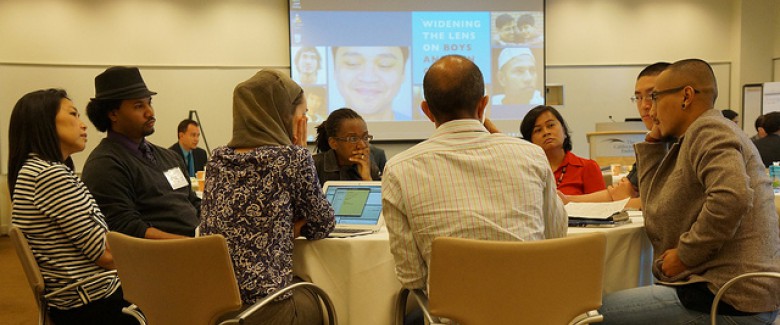Christen Lee is program manager at Emerging Practitioners in Philanthropy, deputy director of Asian Immigrant Women Advocates, and one of our San Francisco chapter co-chairs.This article was cross-posted on NCRP’s blog and EPIP’s website, and was originally published on May 7, 2015. Follow @clee510 on Twitter and join the #CultivateNonprofitLeadership conversation.
In Cultivating Nonprofit Leadership: A (Missed?) Philanthropic Opportunity, NCRP discusses how social movements benefit when grassroots leaders have transformative leadership development opportunities, complementing its earlier Grantmaking for Community Impact Projectseries that spotlights community leadership as a strategy for social change. Taken together, these reports make a strong case for investing in leadership at all levels of the social movement ecosystem, from staff to constituents.
The Oakland-based Asian Immigrant Women Advocates (AIWA) is a 30-year-old grassroots organization that invests in, and more specifically, prioritizes, the long-term leadership development of its constituents. AIWA’s Community Transformational Organizing Strategy (CTOS) is an evidence-based and systematic grassroots leadership development model based on decades of community-driven campaigns and peer-led organizing.
AIWA’s members are first-generation immigrant Chinese and Korean women, and first generation immigrant Chinese youth, with minimal to limited English proficiency. Their average household income is less than $20,000. They face special barriers, including language access, economic marginalization and social isolation, which can prevent them from achieving equitable participation in social movements and civic society. However, when provided with the right tools, knowledge, time and relationship-building opportunities, they develop the kind of individual and collective leadership that not only allows them to improve conditions in their workplaces and schools, but also challenges mainstream society’s assumptions about the face and voice of leadership for social change.
Hai Yan is one of several thousand immigrant women who have participated in AIWA’s grassroots leadership development program. Now a senior trainer, she explains how she developed a sense of her own power and ability to influence social change:
“If I never came to AIWA, I would still [feel like I was] stuck in a cup. Now I’ve stepped outside of the cup to the outside world. … What is life like inside a cup? Eat, sleep, work, come home. But outside, since coming to AIWA, I meet a lot of people, come into contact with [people from] other races, go into different groups and organizations to give speeches. Grassroots women like us even have the courage to go to places like [U.C.] Berkeley and give presentations to university students. And if we see something that is unfair, then we will fight for change.”
AIWA has found that transformative leadership development is also transferrable leadership development. Members apply the confidence and skills they gain to all areas of their lives. For example, many of our grassroots leaders started out as garment workers and participated in AIWA’s early campaigns for garment worker justice. Over the years, as garment manufacturing jobs moved overseas, they had to find jobs in other industries. Many of them are now home care workers and have organized themselves into a Home Care Workers Committee, where they are applying their leadership skills to launch two entirely member-driven/member-led campaigns for language access and enforceable employment agreements.
Transformative leadership development is also transferrable in the sense that leaders can “pay it forward” and empower others. Members who participate in AIWA’s leadership development program lead all of AIWA’s programs. This peer-led approach to programs helps immigrant women and youth reframe their expectations and sense of their own potential to influence change. For example, our ergonomic safety workshops are entirely directed by limited-English speaking immigrant women, who are low-wage workers like the workshop participants themselves.
NCRP’s reports demonstrate that successful leadership development takes time and resources, a fact AIWA knows to be true from first-hand experience. AIWA developed a database to track members’ leadership development progress and to assess its programs. About five years ago, AIWA also embarked on a collaborative research and evaluation project with scholars who study grassroots leadership in social movements. The research project combines quantitative and qualitative analysis of information from the database, along with focus groups, surveys and interviews conducted with AIWA’s women members. In the future, we hope to develop more resources to further solidify and expand our research by collaborating with other community groups that prioritize grassroots leadership development. In the meantime, a preliminary study with a sample size of approximately 800 low-income, limited-English speaking Chinese and Korean women revealed that it takes five to eight years for them to build and sustain their leadership and participation in social movements and civic society.
Institutional and systemic barriers to equity and leadership exist not only within the broader society, but also within the social movement ecosystem. Building and sustaining social movements requires investing beyond specific issue areas and single campaigns. It requires investing in the people themselves. Without long-term grassroots leadership development, “social movements [may turn] into service providers and grassroots members into clients.” If we want to build a truly democratic and equitable society, let’s invest the time and resources necessary to build the leadership of all its members.

